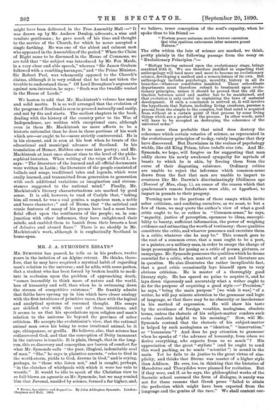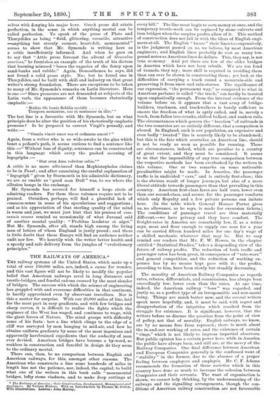MR. J. A. SYMONDS'S ESSAYS.*
Mn. SYMONDS has passed, he tells us in his preface, twelve years in the isolation of an Alpine retreat. He thinks, there- fore, that he may have acquired a mystical habit of regarding man's relation to the universe ; and he adds, with some pathos, that a student who has been forced by broken health to medi- tate in seclusion upon the problem of approaching death, "comes insensibly to think more of nature and the world, less of humanity and self, than when he is swimming down the stream of competitive existence." He frankly admits that faiths have sprung up in him which have closer analogy with the first intuitions of primitive races, than with the logical and analytical systems of reasoned thought. His essays are sicklied o'er with the cast of these intuitions, and it seems to us that his speculations upon religion and man's relation to the universe lie beyond the province of sober criticism. He accepts the evolutionist's view, that the rational animal man owes his being to some irrational animal, be it ape, chimpanzee, or gorilla. He believes, also, that science has rediscovered God, and that the conception of Deity immanent in the universe is tenable. It is plain, though, that in the long. run, this re-discovery and conception are barren of comfort for what Mr. Symonds calls "the poor, illogical, indomitable soul of man." "She," he says in plaintive accents, "cries to God in the world-storm, yields to God, drowns in God," and is crying, perhaps, to "those who listen not," and is caught, perhaps, "in the clutches of whirlpools with which it were too vain to wrestle." It would be idle to speak of the Christian view to so full-blown an agnostic as Mr. Symonds; but we may remind him that Juvenal, unaided by science, formed a far higher, and,
• Essays, Speculative and Suggestive. By John Addington Symonds. London : Chapman and Hall. 1890.
we believe, truer conception of the soul's capacity, when he spoke thus to his friend :—
" Fortem posce animmn mortis terrore carentem Qui vital spatinm extremum inter munera ponat NaturLe."
The rifts within the lute of science are marked, we think, pretty plainly in the following passage from the essay on "Evolutionary Principles :"- "Biology having entered upon the evolutionary stage, brings mankind with it. We are therefore justified in expecting that anthropology will tend more and more to become an evolutionary science, developing a method and a nomenclature of its own. But anthropology includes psychology, morality, history in all its branches—whatever constitutes mankind. These subordinate departments must therefore submit to treatment upon evolu- tionary principles, unless it should be proved that the old dis- tinction between mind and matter has to be maintained, and that evolution is only useful in explaining the laws of material development. If such a conclusion is arrived at, it will involve the hypothesis that Nature, including living creatures, pursues a process from the simple to the complex, but that mind is acquired from without at a certain point of that process by some living things which are a product of the process. In other words, mind will have to be accepted as destroying the coherence of the universal order."
It is more than probable that mind does destroy the coherence which certain votaries of science, as represented in the evolutionary principles of to-day, vainly imagine that they have discovered. But Darwinism in the realms of psychology wields, like old King Priam, telum imbelle sine ietu. And Mr.
Symonds, we hope, will forgive us for suggesting that man oddly shows his newly awakened sympathy for myriads of beasts to which he is akin, by freeing them from the curse of their disgusting existence. Ordinary critics are unable to reject the inference which common-sense draws from the fact that men are unable to impart to creatures like Mr. Darwin's discriminatingly libidinous ape
(Descent of Man, chap. i.), an ounce of the reason which that quadruman's remote forefathers were able, ex hypothesi, to. impart in pounds to their progeny.
Turning now to the portions of these essays which invite sober criticism, and confining ourselves, as we must, to but a few of them, we may quote the author's view of what a good critic ought to be, or rather is. "Common-sense," he says, "sagacity, justice of perception, openness to ideas, suscepti- bility to beauty, sufficient information, the power of weighing evidence and estimating the worth of testimony: these qualities constitute the critic, and whoever possesses and exercises them is a critic, whatever else he may be." This remark goes to the root of a common error, that a man ought to be a poet, or a painter, or a military man, in order to escape the charge of inept presumption for posing as a critic of poems, pictures, or campaigns. Mr. Symonds possesses the qualities which he deems essential for a critic, when matters of art and literature are in question. He also illustrates the rather inexplicable fact, that a good critic occasionally lays himself open to very obvious criticism. He is master of a thoroughly good literary style. He has spared no pains to acquire it, and he lays down vigorously and accurately what a writer ought to do for the purpose of acquiring a good style :—" Precision," he says, "being the main purpose" [we wish it was] "of a writer, he will pay minute attention to the grammar and logic of language, so that there may be no obscurity or incoherence in his method of expression. He will show his taste by the avoidance of foreign vocables, neologisms, obsolete
terms, unless the rhetoric of his subject-matter renders such verba insolentia helpful to his meaning." Now, will Mr. Symonds contend that the rhetoric of his subject-matter
is helped by such neologisms as "ideation," "innervation,"
or " humanism "? And does he pay attention to grammar when he speaks of "the advance of humanity, from whom. we derive everything, who expects from 11E3 so much " ? His appreciation of the great " stylists " (and he ought to send this word packing, as he sends "scientist ") is sound in the main. Yet he fails to do justice to the great virtue of sim-
plicity, and thinks that Sterne was master of a higher style than Addison. He errs, too, in thinking that the histories of Herodotus and Thucydides were planned for recitation. But if they were, and if, as he says, the philosophical works of the Socratic school assumed the form of dialogue, it surely was not for those reasons that Greek prose "failed to attain the perfection which might have been expected from the language and the genius of the race." We shall content our- selves with denying his major here. Greek prose did attain perfection, in the sense in which anything mortal can be called perfection. To speak of the prose of Plato and Thucydides as being "fluid, glittering, versatile, attractive —anything but sternly earnest, heart-felt, monumental" seems to show that Mr. Symonds is writing here as a critic insufficiently informed. And when he goes on to say that "Attic prose forecast the advent of Grweulus esuriens," he furnishes an example of the truth of his dictum that learning misused "bases the vagaries of the fancy upon sand-banks and rubble." Again, Demosthenes, he says, did not found a solid prose style. No; but he found one in Thncydides, and he built with skill and industry on that great writer's strong foundation. There are exceptions to be taken to many of Mr. Symonds's remarks on Latin literature. Here is one :—" Since pronouns are not demanded as subjects of the Latin verb, the appearance of them becomes rhetorically emphatic :— ine bonis ilebilis occidit Tempora mutantur, nos et mutamur in Wis.' " The last line is a favourite with Mr. Symonds, but on what principle does he alter the position of his rhetorically emphatic pronoun ? Is he prepared to correct Virgil's prosody, and write :— " Omnia vincit amor nos et cedamus amori P" Again, from a writer who is so wide-awake to the gins which beset a pedant's path, it seems curious to find a sentence like this :—" Without loss of dignity, sentences can be constructed in this language which carry the packed meaning of logogriphs 4Stat crux dum volvitur orbis."
A critic is no more allwissend than Mephistopheles claims to be in Faust; and after examining the careful explanation of 4' logogriph" given by Stormonth in his admirable dictionary, we are as unable as "good man Dull" was, to see where the allusion hangs in the exchange.
Mr. Symonds has secured for himself a large circle of admiring readers. For them these volumes require not to be praised. Outsiders, perhaps, will find a plentiful lack of common-sense in some of his speculations and suggestions ; and as his appreciation of that sterling quality of the mind is warm and just, we must just hint that his praises of com- munis sensus remind us occasionally of what Juvenal said of another mental quality : " Probitas laudatur et alget." But Mr. Symonds, after all, stands high among the living men of letters of whom England is justly proud ; and there is little doubt that these Essays will find an audience neither unfit nor few. We heartily wish the writer better health and a speedy and safe delivery from the jungles of "evolutionary principles."



































 Previous page
Previous page